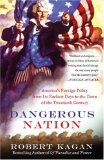Summary | Excerpt | Reviews | Beyond the Book | Readalikes | Genres & Themes | Author Bio
America's Place in the World from Its Earliest Days to the Dawn of the Twentieth Century
by Robert Kagan

Critics' Opinion:
Readers' Opinion:
First Published:
Oct 2006, 544 pages
Paperback:
Nov 2007, 544 pages
 Book Reviewed by:
Book Reviewed by:
BookBrowse Review Team
Buy This Book
America, in turn, became not a promised land but a burial ground for the kind of Puritan theocracy Winthrop and his followers had hoped to establish. Puritanism died in part because the American wilderness, like the biblical Israel, was a land of milk and honey. The New World was too vast for the Puritans’ worldly asceticism. Their rigid theocracy required control and obedience and self-restraint, but the expansive North American wilderness created freedom, dissent, independence, and the lust for land. The abundance of land and economic opportunities for men and women of all social stations diverted too many minds from godly to worldly pursuits. It undermined patriarchal hierarchy and shattered orthodoxy. Those who did not like the way the doctrines of Calvinism were construed and enforced in the Massachusetts Bay Colony had only to move up the Connecticut Valley. Within a dozen years after Winthrop’s arrival, Puritan divines were decrying their parishioners’ sinful desire for ever more “elbow-room” in their New World. “Land! Land! hath been the Idol of many in New-England,” cried Increase Mather. “They that profess themselves Christians, have foresaken Churches, and Ordinances, and all for land and elbow-room enough in the World.”
The rich lands of North America also helped unleash liberal, materialist forces within Protestantism that overwhelmed the Puritan fathers’ original godly vision and brought New England onto the path on which the rest of British-American civilization was already traveling: toward individualism, progress, and modernity. With so many opportunities for personal enrichment available in the New World, the “Protestant ethic,” as Max Weber called it, which countenanced the rewards of labor as a sign of God’s favor and which demanded hard work in one’s “calling” as a sign of election, became a powerful engine of material progress. In a short time, settlers, plantation owners, and the increasingly prosperous and powerful merchants of Boston—the so-called River Gods—came to worship at altars other than those of their Calvinist fathers and grandfathers. The liberal, commercial ethos of these new mercantile groups represented the spirit of a new age, whose “guiding principles were not social stability, order, and the discipline of the senses, but mobility, growth, and the enjoyment of life.”
By the early eighteenth century Puritan New England had entered “the emerging secular and commercial culture” of Anglo-America. The New Englanders “relinquished their grand vision of building a city upon a hill,” and Puritanism itself melted into the new, modernizing society. The burst of religious revivalism in the early to mid-eighteenth century, termed the Great Awakening, was a monument to Puritanism’s failure, a worried response to the increasing secularization of American society and to the spread of Christian rationalism and Deism among colonial elites. From its original pious ambitions, Jonathan Edwards lamented, the Puritans’ America had fallen into sin. History had never witnessed “such a casting off [of] the Christian religion,” nor “so much scoffing at and ridiculing the gospel of Christ by those that have been brought up under gospel light." Even Edwards’s own reactionary revivalism was shaped by the new realities of life in an expansive, modernizing, and free America, for his was a democratized, antihierarchical Puritanism that conformed to the increasingly fluid nature of colonial American society. His effort to stem the tide of liberalism and modernity was futile. As Edwards wrote his treatises on faith and salvation and obedience to God, his fellow British colonials were “beginning to think of themselves as having individual rights that were self-evidently endowments of nature.” By the last quarter of the eighteenth century a foreign observer like the French immigrant Michel-Guillaume-Jean de Crèvecoeur could write of Americans that they “think more of the affairs of this world than of those of the next.”
Excerpted from Dangerous Nation by Robert Kagan Copyright © 2006 by Robert Kagan. Excerpted by permission of Knopf, a division of Random House, Inc. All rights reserved. No part of this excerpt may be reproduced or reprinted without permission in writing from the publisher.





The Flower Sisters
by Michelle Collins Anderson
From the new Fannie Flagg of the Ozarks, a richly-woven story of family, forgiveness, and reinvention.

The House on Biscayne Bay
by Chanel Cleeton
As death stalks a gothic mansion in Miami, the lives of two women intertwine as the past and present collide.

The Funeral Cryer by Wenyan Lu
Debut novelist Wenyan Lu brings us this witty yet profound story about one woman's midlife reawakening in contemporary rural China.
Your guide toexceptional books
BookBrowse seeks out and recommends the best in contemporary fiction and nonfiction—books that not only engage and entertain but also deepen our understanding of ourselves and the world around us.